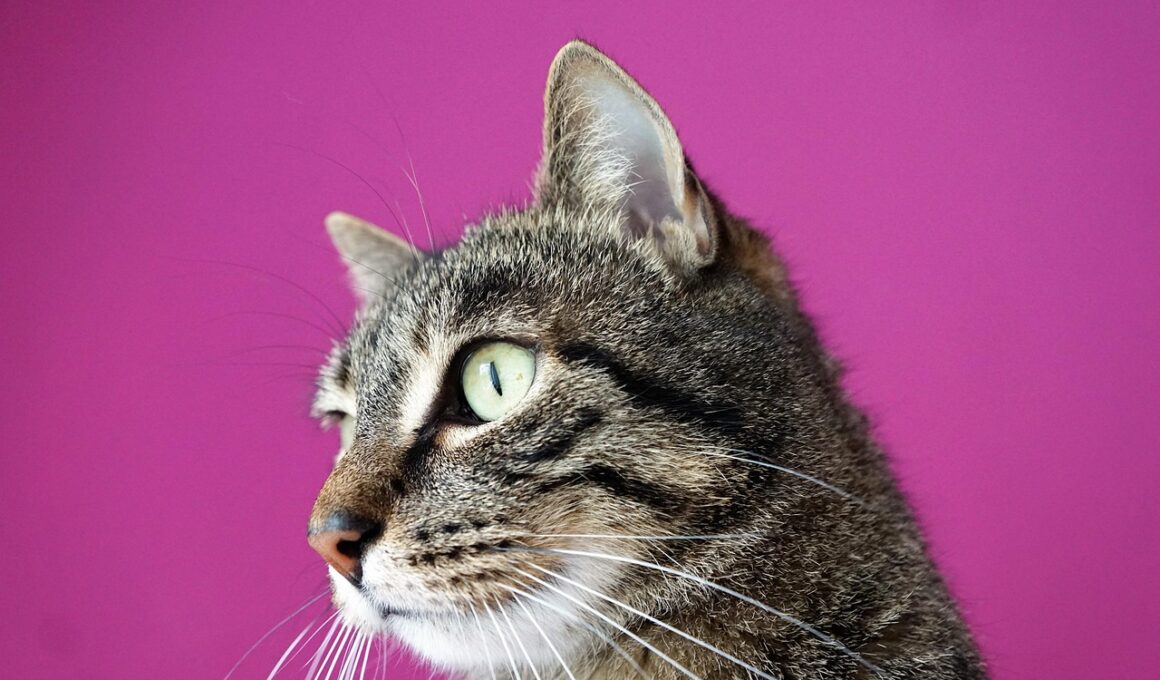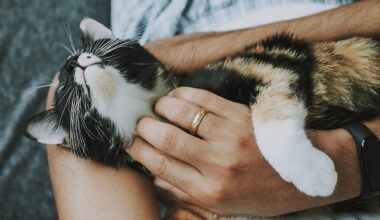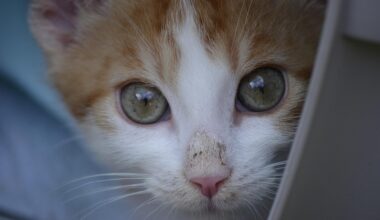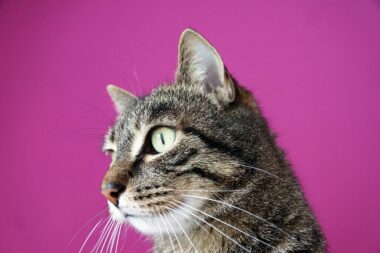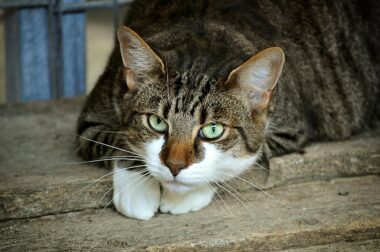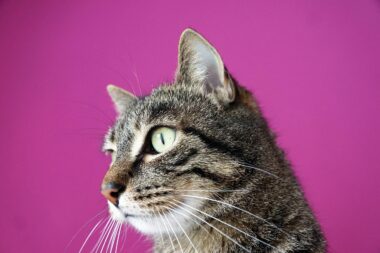How Stress Influences Nutritional Absorption and Vitamin Status in Cats
Stress can significantly impact a cat’s health and is a crucial factor in their nutritional absorption and vitamin requirements. Cats experience stress from various sources, including environmental changes, loud noises, or new pets in the home. This emotional upheaval can lead to altered hormone levels, making it difficult for cats to absorb nutrients effectively. The digestive system reacts to stress by slowing down, leading to possible gastrointestinal issues that could impair health. A stressed cat may also exhibit changes in appetite, either eating less or overeating, which complicates the situation. Ensuring adequate vitamin intake is vital during these times, as vitamins play essential roles in supporting overall health and well-being. A deficiency in vitamins such as B-complex can lead to further health issues, including fatigue and weakness. To mitigate stress effects, providing a stable environment and considering behavioral enrichment can help. Recognizing signs of stress is key for cat owners. Monitoring their behavior and adjusting their diet accordingly can greatly influence their health positively, promoting a happier and healthier cat in the long run.
Cats require a variety of vitamins to maintain optimal health, but stress can disrupt the balance of these necessary nutrients within their bodies. When a cat is under stress, its metabolism can alter, affecting how vitamins are processed and utilized. For instance, vitamin C is known for its role in stress management, but with increased stress, the body’s demand for this vitamin rises. Therefore, a cat under stress may need more vitamin C than typically required. Similarly, the body’s capacity to absorb nutrient-rich foods may decline, leading to deficiencies in critical vitamins. It’s essential for cat owners to understand that nutrient needs may fluctuate based on stress levels. Consultation with a veterinarian is vital to devise an effective nutritional plan tailored to a cat’s specific needs during stressful times. Maintaining hydration and proper nutrition can support overall health. Including wet food can provide hydration, while vitamins like E and D support the immune system. Addressing these nutritional needs not only aids in mitigating stress but can also promote recovery and ensure well-being in cats under strain.
Understanding the Role of Vitamins
Vitamins play various roles in maintaining a cat’s health, particularly in stressful situations. For example, vitamin A is crucial for vision and immune function, while B vitamins aid in energy metabolism and neurological function. When cats undergo stress, the demand for these essential nutrients may escalate, directly impacting their overall health. While some vitamins are naturally produced by the body, others must be supplemented through diet. It’s important to note that a balanced diet alone might not suffice during periods of stress. Supplementation of specific vitamins can be beneficial in enhancing nutrient levels. In this regard, vitamin E stands out for its antioxidant properties, which help combat oxidative stress in the body. Meanwhile, Vitamin D is vital for calcium absorption. Ensuring these vitamins are part of a cat’s diet can greatly influence their resilience against stress. Additionally, environmental factors should be addressed to minimize stress levels. Creating a safe space, reducing loud noises, and incorporating calming elements can significantly alleviate stress and contribute positively to a cat’s nutritional status and vitamin absorption effectiveness.
Stress can manifest differently in cats and lead to overlapping symptoms that could further complicate nutritional needs. Understanding the physical symptoms associated with stress in cats is crucial; they may include lethargy, reduced appetite, or vomiting. These symptoms can indirectly influence vitamin status by causing a decrease in food intake, thereby limiting the nutrients consumed. It’s vital for pet owners to monitor their cat’s behavior and eating habits closely, especially during stressful times. Inadequate nutrition due to stress can lead to elevated anxiety levels, creating a vicious cycle that can be difficult to break. Therefore, ensuring that a cat receives a well-rounded diet supplemented with essential vitamins during these periods is critical. Providing vitamin-rich treats can also encourage eating behaviors. Careful alterations to feeding times or locations can minimize stress triggers during mealtime. Moreover, providing an enrichment environment with toys and play can help alleviate anxiety. Regular check-ups with veterinary professionals can help identify any underlying health concerns that stress might reveal, allowing for timely interventions to ensure that your cat remains healthy and well-nourished.
Dietary Strategies for Stress Management
To effectively manage your cat’s vitamin needs during stressful periods, it’s important to consider dietary strategies tailored to their unique situations. A well-balanced diet plays a crucial role in promoting overall well-being, particularly in stress management. High-quality commercial cat foods typically contain essential vitamins, but during periods of stress, supplementation with specific vitamin-enhanced products may be necessary. For instance, adding omega-3 fatty acids can help improve mood and promote relaxation. Consult with your veterinarian to personalize dietary recommendations based on your cat’s specific stressors. Gradually transitioning to a diet that includes stress-reducing ingredients can help ease anxiety. Opt for natural additives like natural herbs such as chamomile or valerian root known for their calming properties. Furthermore, consider incorporating wet food that can offer hydration as well as additional nutrients. Proper feeding routines should be established, avoiding sudden changes that could further provoke stress. Keeping feeding areas consistent and quiet can foster a sense of security, significantly improving the likelihood that your cat will thrive nutritionally during stressful times.
Beyond dietary considerations, lifestyle changes can aid in improving a cat’s vitamin absorption during times of stress. Providing an enriched environment enhances a cat’s quality of life and can occupy their minds, diverting their attention from stressors. Activities such as interactive play not only promote physical health but also stimulate mental engagement, making cats feel more secure and relaxed. Establishing a regular routine can help a cat’s body adapt, reducing anxiety levels substantially. This routine can include designated playtimes, feeding, and relaxation periods. Moreover, introducing calming pheromones or specialized calming diets may also alleviate stress, thus enhancing their ability to absorb vitamins effectively. Owners should be mindful of how their cats react to changes in their surroundings. Consistent environments and familiar scents can provide reassurance. Encounters with unfamiliar animals or loud noises can overwhelm a cat, impacting its nutritional status. Consequently, fostering a peaceful atmosphere can be beneficial. Ultimately, it’s all about creating a holistic approach that combines diet, environment, and routine to ensure full health benefits in stressed cats.
Monitoring Health and Vitamin Levels
Regular veterinary check-ups serve as an essential foundation in monitoring a cat’s health and their vitamin status, especially during stressful periods. By assessing weight, coat condition, and behavior, veterinarians can provide insights into any nutritional deficiencies present. Blood tests can identify specific vitamin deficiencies that may arise due to stress, guiding further dietary adjustments or interventions. Keeping records of any changes in behavior can also assist veterinary professionals in tracking your cat’s well-being over time. If a vitamin deficiency is identified, veterinarians may suggest appropriate supplements or changes to the cat’s diet tailored to its specific needs. Moreover, being observant of your cat’s mood can provide clues to potential health issues related to stress. Elevated baseline stress levels can lead to increased vulnerability to illness, making it crucial to address vitamin intake adequately. Collaborative communication with your veterinarian ensures that you can navigate potential changes in dietary plans effectively. Establishing a supportive network can enhance your cat’s nutritional health, allowing you to proactively manage stress rather than reactively responding to crises as interest can dramatically enhance their overall wellness.
In conclusion, managing a cat’s vitamin needs during periods of stress is paramount in maintaining their health and overall wellness. Understanding the relationship between stress and nutrient absorption can empower cat owners to make informed dietary choices tailored to their pet’s unique needs. Ensuring that your cat receives a variety of essential vitamins, particularly during stressful times, supports not only physical health but also emotional well-being. Regular veterinary consultations are equally important for monitoring and identifying any deficiencies that may arise due to stress. Cat owners should take an active role in monitoring their pet’s behavior and dietary intake, recognizing changes, and making adjustments when necessary. Creating an enriching, secure environment is crucial, as it ensures that cats feel safe and minimizes stress-related behaviors. With the right combination of diet, routine, and environmental stability, you can foster a thriving environment for your cat. This multi-faceted approach to a stressed cat’s nutrition can not only improve their vitamin status but promote a happier, healthier life, and optimal well-being overall. By understanding and addressing stress effectively, you are sure to enhance your cat’s quality of life.
